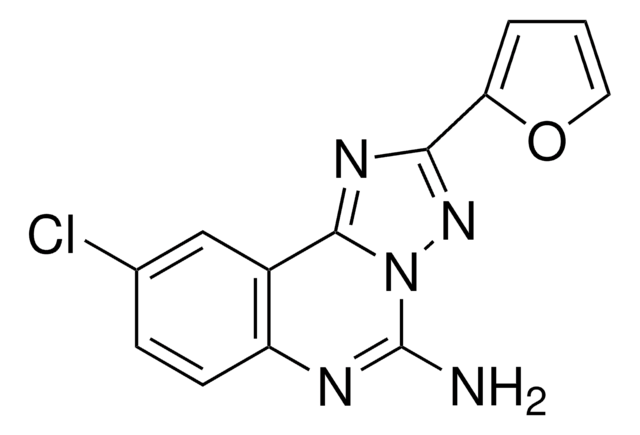推荐产品
生化/生理作用
SM1-71 is a cell penetrant and potent multi-targeted kinase inhibitor that engages kinases through both reversible and irreversible binding. SM1-71 covalently inhibits 23 kinases including MKNK2, MAP2K1/2/3/4/6/7, GAK, AAK1, BMP2K, MAP3K7, MAPKAPK5, GSK3A/B, MAPK1/3, SRC, YES1, FGFR1, ZAK(MLTK), MAP3K1, LIMK1, and RSK2. It binds to the cysteine located in vicinity of active site. In some cases, SM1-71 might bind to Cys located at allosteric places. SM1-71 potently inhibits growth of multiple cancer cell lines.
儲存類別代碼
11 - Combustible Solids
水污染物質分類(WGK)
WGK 3
閃點(°F)
Not applicable
閃點(°C)
Not applicable
Li Tan et al.
Bioorganic & medicinal chemistry, 25(3), 838-846 (2016-12-25)
TAK1 (transforming growth factor-β-activated kinase 1) is an essential intracellular mediator of cytokine and growth factor signaling and a potential therapeutic target for the treatment of immune diseases and cancer. Herein we report development of a series of 2,4-disubstituted pyrimidine
Suman Rao et al.
The Journal of biological chemistry, 294(21), 8664-8673 (2019-03-13)
Most cancer cells are dependent on a network of deregulated signaling pathways for survival and are insensitive, or rapidly evolve resistance, to selective inhibitors aimed at a single target. For these reasons, drugs that target more than one protein (polypharmacology)
Suman Rao et al.
Cell chemical biology, 26(6), 818-829 (2019-04-16)
Covalent kinase inhibitors, which typically target cysteine residues, represent an important class of clinically relevant compounds. Approximately 215 kinases are known to have potentially targetable cysteines distributed across 18 spatially distinct locations proximal to the ATP-binding pocket. However, only 40
我们的科学家团队拥有各种研究领域经验,包括生命科学、材料科学、化学合成、色谱、分析及许多其他领域.
联系技术服务部门







